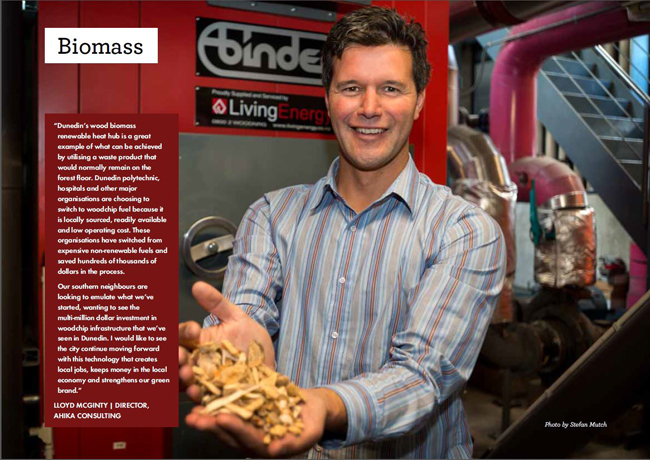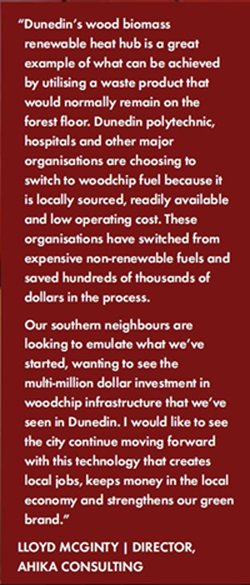
Current position
 Our city’s biomass resources offer viable energy alternatives. If managed sustainably, biomass can provide a source of energy that is economical, local and can reduce environmental effects.
Our city’s biomass resources offer viable energy alternatives. If managed sustainably, biomass can provide a source of energy that is economical, local and can reduce environmental effects.
Dunedin’s industries are already showing signs of adopting biomass energy as a way of improving their triple bottom line. Woodchip is now being used by a number of organisations to replace coal and gas boilers. A micro district heating network has long supplied the university and hospital. Discussion of new or expanded district heating systems to meet more of Dunedin’s energy needs has begun. This may include using biogas, either in new generators like the Green Island landfill or organic waste streams closer to their source.
This action outlines the first steps towards realising Dunedin’s biomass potential.
Action and delivery
A considerable proportion of Dunedin’s forests already provide the city with economic benefit through resource ownership, export earnings and employment. Increasingly, this and other sources of wood fuels are heating some of our largest and most important buildings, including health and education campuses. It is important that this energy resource is well understood and carefully managed. The Baseline Energy action should help us better understand the extent and any limitations of biomass resources.
The Energy Leaders action will support cooperation and information sharing among industries interested in biomass energy. Those already using woodchip and other bioenergy will be encouraged to share their experiences and further actions will be developed based on these experiences, including a better understanding of the potential for shared or district heating systems and any regional implications or opportunities.
Measuring success
Successful delivery of this action will result in:
- better understanding of the extent and limitations of the city’s biomass energy resources for the foreseeable future
- additional uptake of biomass fuels driven by economic and environmental benefit.
Key delivery partners
A number of organisations are already involved in the discussion around bioenergy potentials in Dunedin, including:
- ADI Systems Inc.
- Ahika Consulting
- City Forests
- Dunedin City Council
- Otago Chamber of Commerce
- Otago Polytechnic
- University of Otago
| Proposed activities | ||
| Delivery activities | Lead organisations | Measuring progress |
|---|---|---|
| Inform and use the findings of Baseline Energy to better understand the extent and limitations of Dunedin’s biomass energy resources |
|
|
| Engage with stakeholders in switching to biomass fuels, and link with relevant energy leaders |
|
|
| Gather and publicise lessons learned from existing use of biomass fuel |
|
|
| Advocate for city composting and/or biogas generation from organic wastes, where appropriate |
|
|
| Commission feasibility studies for shared or district heating systems for the city |
|
|
Photo by Stefan Mutch
